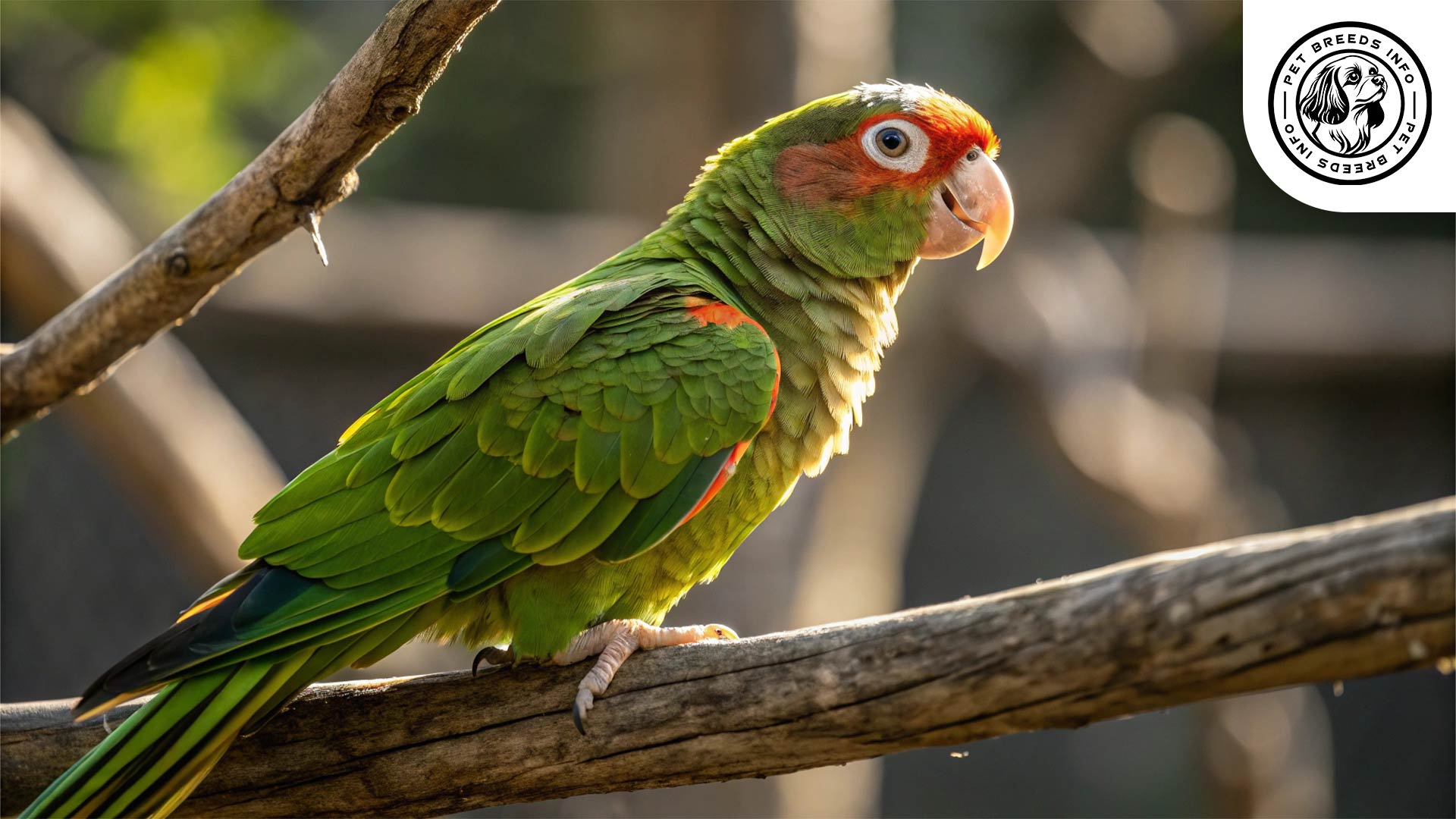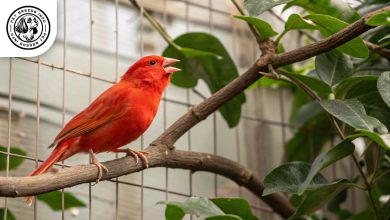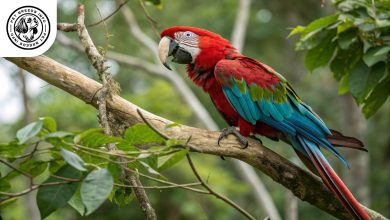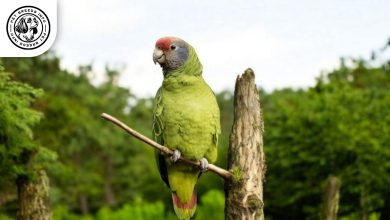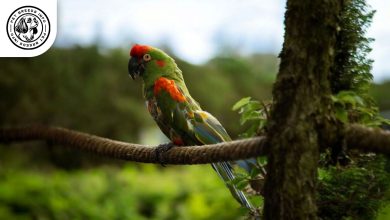Mitred Conure Bird: Personality, Lifespan, Food & Care
General Introduction of the Breed
The Mitred Conure (Aratinga mitrata) is a medium-sized parrot native to South America. It is also known as the Mitred Parakeet and is popular among bird enthusiasts due to its playful personality and striking colors.
Originally found in regions of Peru, Bolivia, and Argentina, the Mitred Conure inhabits forested areas and mountainous regions. Over time, escaped pet birds have established feral populations in Florida, California, and Hawaii.
Table of Contents
| Common Name | Mitred Conure |
| Scientific Name | Aratinga mitrata |
| Origin | South America (Peru, Bolivia, Argentina) |
| Size | 13–15 inches (33–38 cm) |
| Lifespan | 25–30 years |
| Colors | Green with red patches on forehead, face, and wings |
| Talking Ability | Moderate; mimics words and household sounds |
| Noise Level | High; loud squawking and chattering |
| Social Behavior | Highly social, forms strong bonds, can be territorial without early training |
Physical Characteristics
The Mitred Conure is a medium-sized parrot, typically measuring about 13 to 15 inches (33-38 cm) in length and weighing between 7 to 9 ounces (200-250 grams).
Its plumage is predominantly green, with patches of bright red on the forehead, around the eyes, and occasionally on the wings. Some individuals may also have a scattering of red feathers across their body.
The eyes are dark brown with a pale white eye-ring, giving them a striking expression.
The beak is strong, curved, and usually pale in color. The tail is long and tapered, giving the bird an elegant appearance.
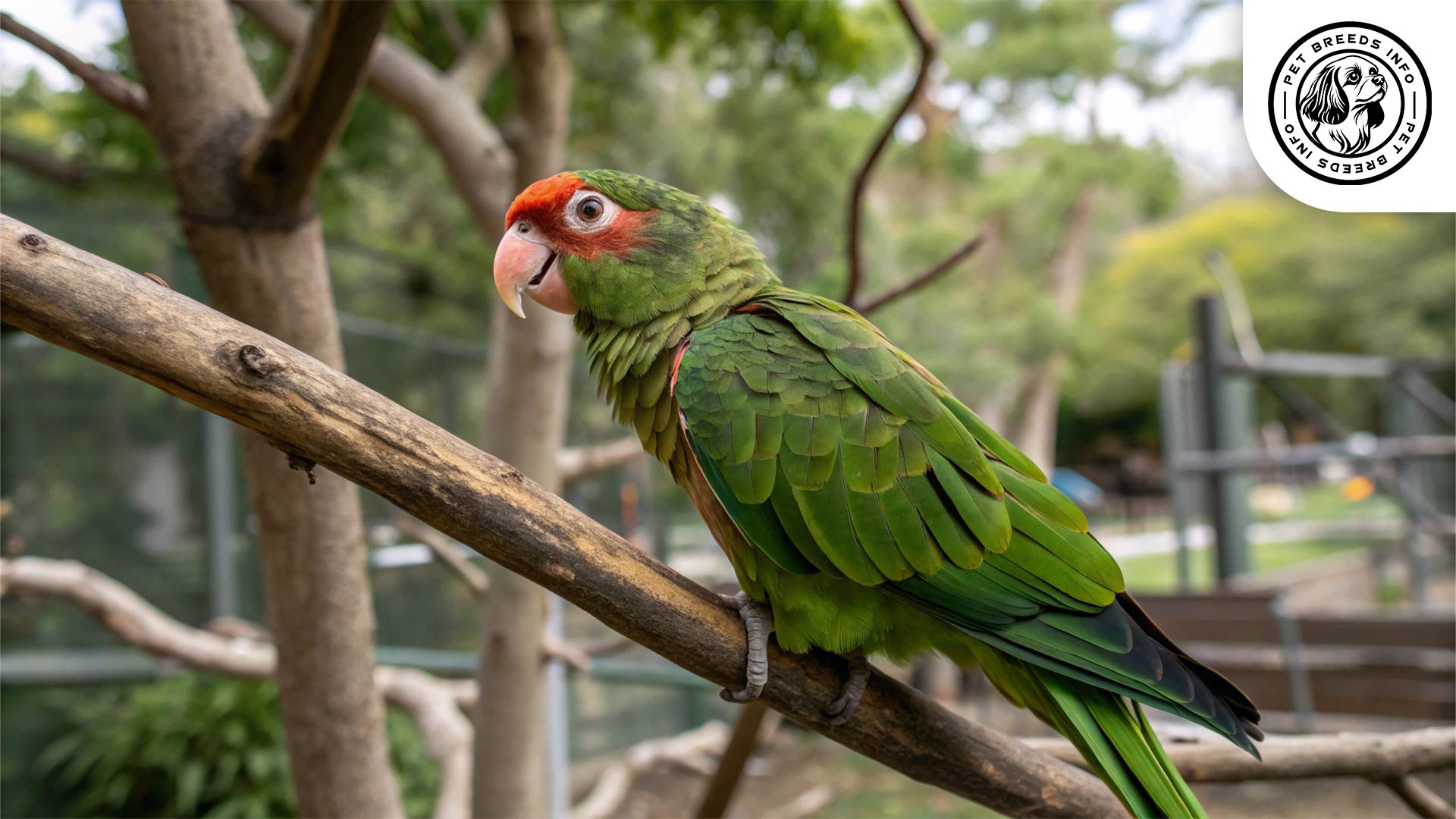
Personality and Temperament
Mitred Conures are highly intelligent and inquisitive birds. They have the ability to learn basic words, phrases, and mimic household sounds.
These birds are very active and require plenty of stimulation to prevent boredom. They love to climb, chew, and explore their surroundings.
They are known for forming strong bonds with their owners and may become affectionate and playful.
Due to their social nature, they thrive on interaction and can become loud if neglected. Their vocalizations include squawking, chattering, and occasional mimicry.
They are friendly but may develop territorial tendencies if not properly socialized from an early age.
Care and Maintenance Requirements
Mitred Conures require daily exercise and mental stimulation. Providing a variety of toys, perches, and climbing structures is essential for their well-being.
An ideal living environment includes a spacious cage with ample room to stretch its wings. A play gym outside the cage is also highly recommended.
They do not require extensive grooming, but regular beak and nail trimming may be necessary. Bathing can be done with a shallow dish of water or a light mist spray.
These birds are sensitive to extreme cold and drafts, so maintaining a consistent indoor temperature is important.
Diet and Nutrition
The diet of a Mitred Conure should consist of high-quality pellets, fresh fruits, vegetables, and occasional seeds or nuts as treats.
Foods that should be avoided include chocolate, avocado, caffeine, alcohol, onions, and salty or sugary foods.
Read More: Wood Duck
Portion sizes should be balanced based on the bird’s activity level, with fresh food provided daily.
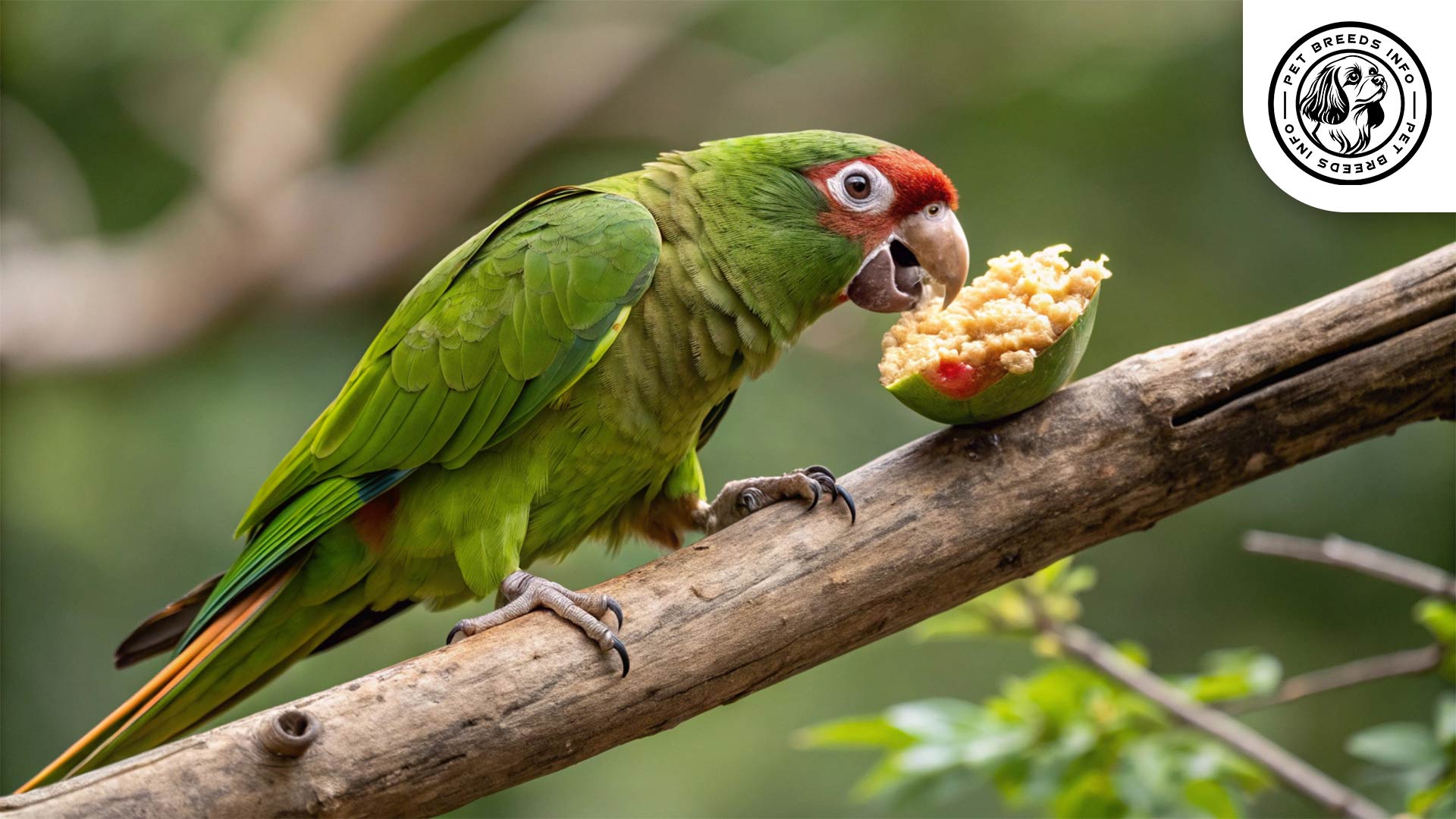
Health and Common Medical Issues
Common health concerns for Mitred Conures include beak malformation, respiratory infections, feather plucking, and vitamin deficiencies.
They have an average lifespan of 25 to 30 years with proper care.
Routine vet check-ups, a balanced diet, and a clean cage environment help prevent many health issues.
Regular vaccinations and parasite control may also be recommended by an avian veterinarian.
Training and Behavior Management
Mitred Conures are highly trainable and respond well to positive reinforcement.
Early training and socialization are crucial to prevent bad habits such as excessive screaming or biting.
Read More: Mourning Dove
Teaching basic commands like “step up” and “step down” can help in handling the bird safely.
A variety of training techniques involving treats and verbal praise work best for reinforcing good behavior.
Interaction with Other Animals and Humans
Mitred Conures generally get along well with families and can form close bonds with multiple members.
They are generally friendly with children but should be supervised to prevent accidental harm.
Interaction with other pets, such as dogs and cats, should be carefully monitored to ensure the bird’s safety.
They typically enjoy the company of other birds but may become territorial, especially during mating season.
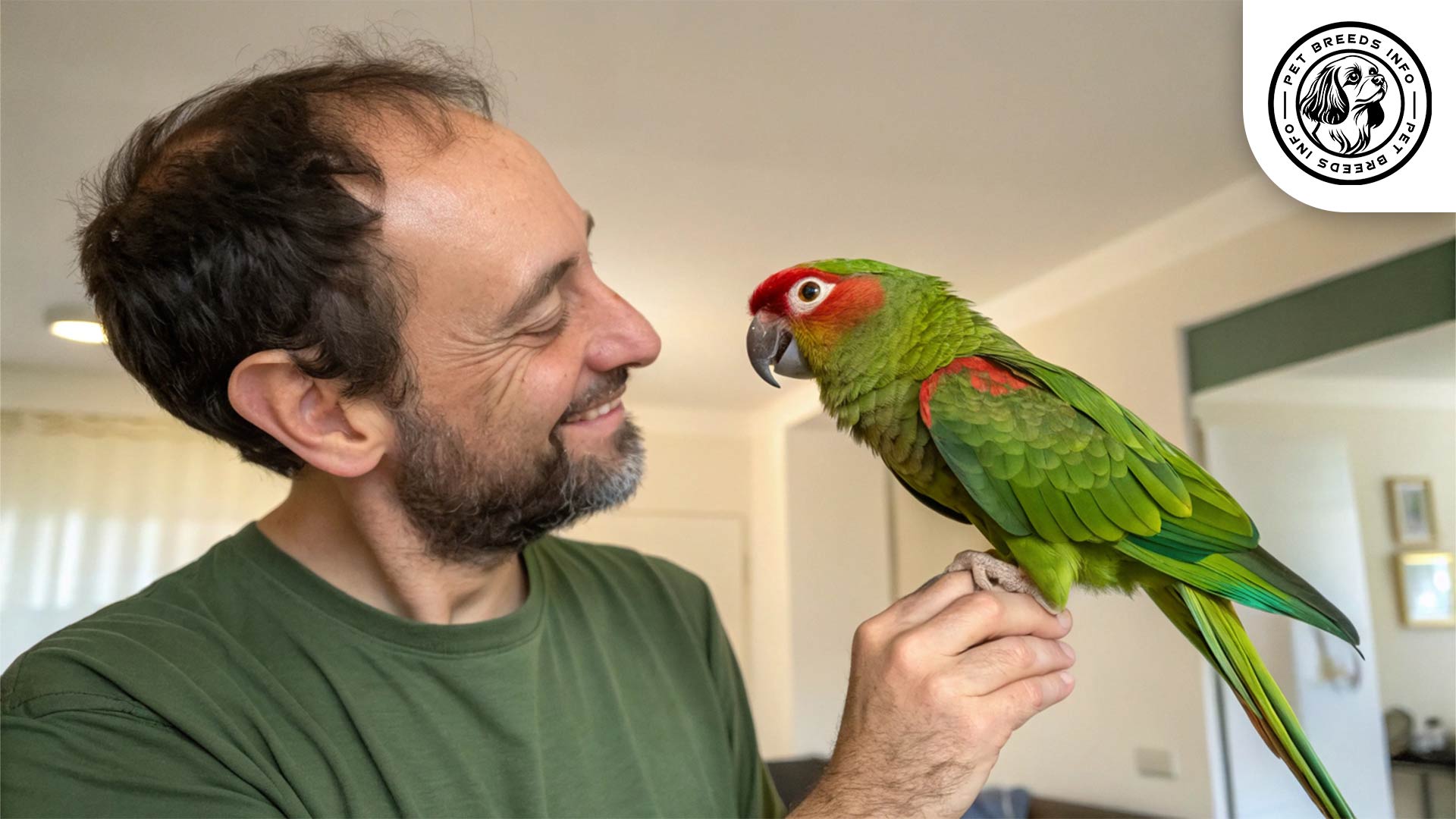
Price and Availability
The cost of a Mitred Conure varies depending on age, breeder, and location. Prices typically range from $300 to $800.
When purchasing, it is advisable to choose a reputable breeder or an avian rescue center that ensures the bird is healthy and well-socialized.
Adoption is another great option, as many Conures in rescue organizations need loving homes.
Conclusion and Final Thoughts
Mitred Conures are energetic, social, and intelligent birds that make wonderful pets for experienced bird owners.
Read More: Moluccan Cockatoo Bird
They require plenty of interaction, mental stimulation, and a proper diet to remain happy and healthy.
Potential owners should be prepared for their high energy levels and loud vocalizations. They are best suited for individuals or families who can devote time to their care and training.
If you are looking for an affectionate and interactive parrot with a playful personality, the Mitred Conure might be the perfect pet for you.
FAQ
Are Mitred Conures good talkers?
They can learn simple words and mimic household sounds, though they are not as fluent as some larger parrots.
How long do Mitred Conures live?
With proper care, Mitred Conures typically live 25 to 30 years.
Do they need a lot of attention?
Yes, they are very social and require daily interaction and mental stimulation to stay happy and healthy.
Are they noisy birds?
Yes, they are known for loud vocalizations, especially if they feel neglected or under-stimulated.
